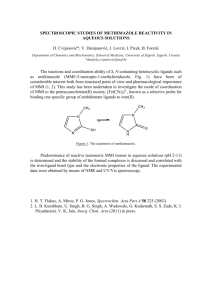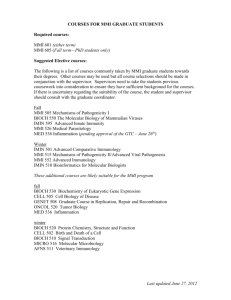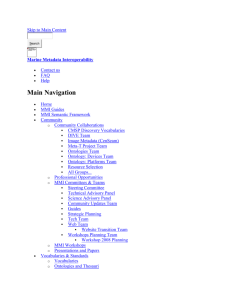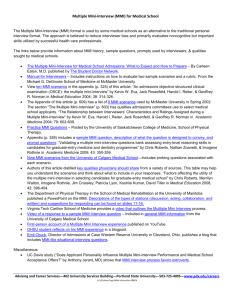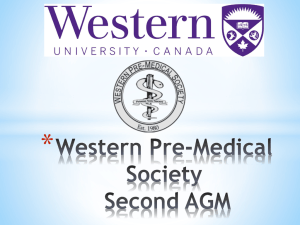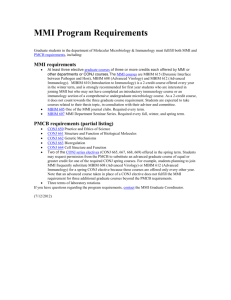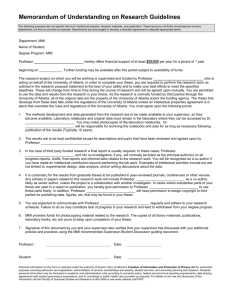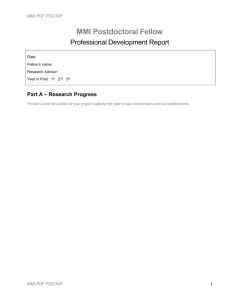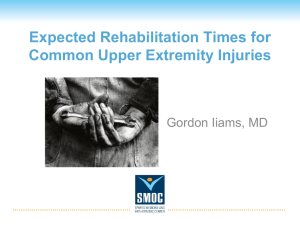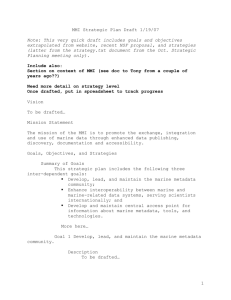multiple mini interview multiple mini-interview (mmi)
advertisement
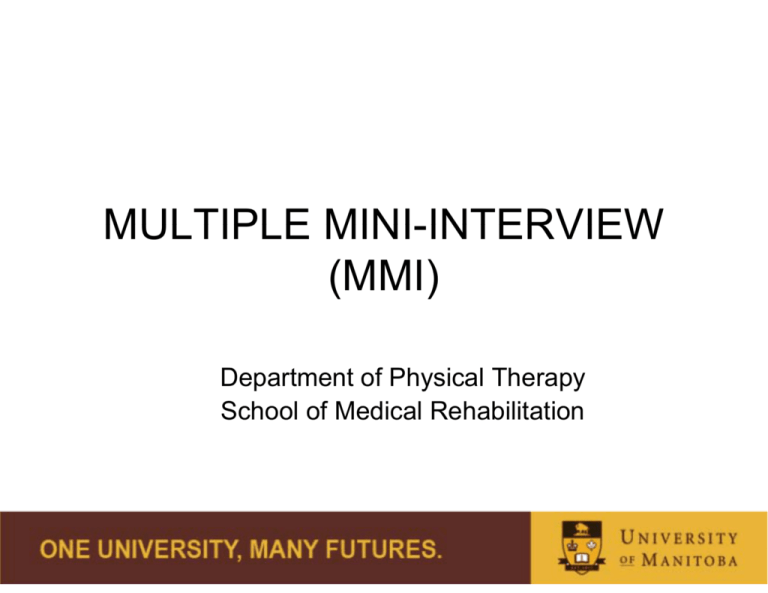
MULTIPLE MINI MINI-INTERVIEW INTERVIEW ( (MMI) ) Department D t t off Physical Ph i l Th Therapy School of Medical Rehabilitation Outline 1 What is the MMI? 1. 2. Whyy the MMI? 3. The logistics of the MMI 4. Types of stations 5 Key points 5. 6. Practice questions q 7. Additional information What is the MMI? It is i a series i off mini-interviews, i ii t i llasting ti 10 min minutes tes each each. Why the MMI? The MMI evaluates personal characteristics (non-cognitive attributes) important for success in the health sciences including: critical thinking ethical/moral decision making self-evaluation communication cultural sensitivity empathy Why the MMI? Thi iinterview This t i method th d provides id an opportunity for applicants to apply general knowledge and personal experiences to issues relevant to the society in which they live and the health care systems in which they hope to work. Why the MMI? The MMI gives the candidates a fresh chance to impress p with every y station. The MMI provides Th id flflexibility ibilit iin questions ti nott available in traditional interviews. Research R hh has shown h th thatt it iis more ffair i ffor the candidates. Logistics of MMI • 8 x 10-minute stations (2 simultaneous tracks) – 2 minutes to read question & 8 minutes to perform • Signal at 8 and 10 minute marks • Interviewer in every room • One global score per candidate per station • Total T t l duration d ti 80 minutes i t Interviewers • Mayy or mayy not be physical p y therapists p • May be health care providers, faculty, students or community members • Have been given specific instructions on what they can and can not ask • Are not aware of your grades or the status of your application li ti • Will give you one global score • If you know the interviewer, continue on. Where does the MMI take place? The Clinical Learning Simulation Facility ((CLSF)) in the basement of the John Buhler Research Centre, U of M Designed for clinical learning and therefore you will see model hospital and clinic rooms, medical equipment, technology and possibly mannequins. A1 A2 TRACK A A8 A7 A3 B1 B3 TRACK B A5 A6 B2 A4 B8 B7 B6 B5 B4 4 types of stations 1. Discussion 2. Acting 3 Collaboration 3. 4. Written Discussion Stations An issue will be posted on the station door which you are to discuss with the interviewer. Interviewers have been provided with background information on each station station. Th will They ill engage with ith you iin di discussion. i They may or may not ask questions specific to the issue. Acting Stations A scenario will be p posted on the station door. Enter the room and engage with the individual in the room as if he/she is the person in the scenario. p An interviewer A i t i will ill also l b be iin th the room, evaluating your response. Collaboration Stations Instructions will be posted on the station door. Proceed into the room and do as the instructions indicate. There will be another individual in the room with whom h you mustt complete l t a task t k or activity. ti it An interviewer will also be in the room, judging your communication and collaboration skills. Written Station Aq question will be p posted at the station in the hallway. Write a response in the text box on the computer provided. You will be evaluated according to the content, clarity of your response, spelling and grammar. The Internet will have been disabled. A hall monitor will be available to assist you with any technical difficulties. Key points 1 Read 1. R d th the question ti carefully f ll b before f entering the room. Copies of the questions will also be provided in the station rooms rooms. 2. Make short notes for yourself if you wish. Clipboards and pencils will be provided provided. Key points 3. Always answer the question. There is no right or wrong answer answer. 4. Speak clearly and articulate your ideas as best as you can can, based on your knowledge and life experiences. Practice MMI questions Preferential Admission (Societal Health Issues in Canada) Due to the shortage g of p physical y therapists p in rural communities, it has been suggested that physical therapy programmes preferentially admit students who are willing illi tto commit it tto a 2 or 3 year ttenure iin an underd serviced area upon graduation. Consider the broad implications of this policy for health and health care costs. For example, do you think the approach will be effective? At what expense? Discuss this issue with the interviewer. Practice MMI questions Class Size (Critical Thinking) Universities are commonly faced with the complicated task of balancing the educational needs of their students and the cost required to provide learning resources to a large number of individuals. As a result of this tension tension, there has been much debate regarding the optimal size of classes. One side argues that smaller classes provide a more educationally effective setting for students students, while others argue that it makes no difference, so larger classes should be used to minimise the number off instructors required. Discuss your opinion on this issue with the examiner. Practice MMI questions Air Travel (Communication Skills) Your company needs both you and a coco worker (Sara, a colleague from another branch of the company) to attend a critical business meeting in San Diego. You have just arrived to drive Sara S to the airport. Sara (played by an actor) is in the room. Additional information All applicants li t attending tt di iinterviews t i will ill b be required to sign a Confidentiality Agreement to ensure the security of interview scenarios and a Audiovisual recording and release form for quality management purposes. 2013 MMI Dates The MMI for 2013 is scheduled for the weekend of March 2 and 3. Letters of offer for an interview will be sent out the b i i off F beginning February; b an iimmediate di t reply l will ill be required. The exact time,, date and location of your y interview will be indicated on the letter of offer. MMI Dates Applicants offered interviews should note that, the MMI will be scheduled only once per year. Rescheduling, R h d li regardless dl off the reason reason, cannot be accommodated accommodated. Requests for accommodation The Department p of Physical y Therapy py welcome applications from a diverse range of abilities. abilities Please note however however, that the activities of PT practice are physically challenging See the Essential Skills challenging. Document on our website for more details. Should you require special accommodation for the MMI , please contact the Chair of Admissions for Physical Therapy. Additional Resources For specific information sessions on the MMI, including practice opportunities, please contact Career Services at the University of Manitoba at 474 University Centre Tel: (204) 474-9456 (CST) Monday to Friday 8:30 a.m. – 4:30 p.m. http://umanitoba.ca/student/employment Additional Resources For an audiovisual orientation to the MMI, please visit the link below. p http://media.cc.umanitoba.ca:8080/ramge htt // di it b 8080/ n/faculties/medicine/med_rehab/mmi_m ac.mp4 Acknowledgement We gratefully acknowledge the work of the Michael G G. DeGroote School of Medicine at McMaster University for the p , evaluation and on-going g g development, enhancements of the Multiple MiniInterview. References Eva KW, Rosenfeld J, Reiter HI, Norman GR. (2004). An admissions OSCE: The Multiple Mini‐Interview. Multiple Mini Interview. Medical Education 38: 314 Medical Education 38: 314‐326. 326. Humphrey, S., Dowson, S., Wall, D., Dinakar, V., & Goodyear, H.M. (2008) Multiple mini‐interviews: Opinions of candidates and interviewers. M di l Ed ti Medical Education, 42 (2), 207‐213. 42 (2) 207 213 Lemay, J.F., Lockyer, J.M., Collin, V. T., & Brownell, A. K. (2007). Assessment on non‐cognitive traits through the admissions multiple mini‐interview. Medical Education 41 (6) 573‐579. McMaster University. (2009). MMI ‐Multiple Mini Interviews Operational Guidelines Hamilton Ontario Canada: Author Guidelines. Hamilton, Ontario, Canada: Author. Moreau, K., Reiter, H., & Eva, K. W. (2006). Comparison of aboriginal and non‐ aboriginal applicants for admissions on the multiple mini‐interview using aboriginal and non‐aboriginal interviewers. Teaching and Learning in Medicine, 18(1), 58‐61. Outline 1 What is the MMI? 1. 2. Whyy the change g to the MMI? 3. The logistics of the MMI 4. Types of stations 5 Key points 5. 6. Practice questions q 7. Additional information
